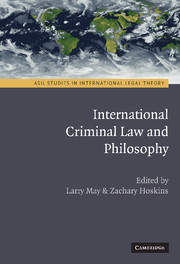Book contents
- Frontmatter
- Contents
- List of Contributors
- Introduction
- PART ONE SOVEREIGNTY AND UNIVERSAL JURISDICTION
- 1 International Crimes and Universal Jurisdiction
- 2 State Sovereignty as an Obstacle to International Criminal Law
- 3 International Criminal Courts, the Rule of Law, and the Prevention of Harm: Building Justice in Times of Injustice
- PART TWO CULTURE, GROUPS, AND CORPORATIONS
- PART THREE JUSTICE AND INTERNATIONAL CRIMINAL PROSECUTIONS
- PART FOUR PUNISHMENT AND RECONCILIATION
- Index
- References
2 - State Sovereignty as an Obstacle to International Criminal Law
Published online by Cambridge University Press: 19 January 2010
- Frontmatter
- Contents
- List of Contributors
- Introduction
- PART ONE SOVEREIGNTY AND UNIVERSAL JURISDICTION
- 1 International Crimes and Universal Jurisdiction
- 2 State Sovereignty as an Obstacle to International Criminal Law
- 3 International Criminal Courts, the Rule of Law, and the Prevention of Harm: Building Justice in Times of Injustice
- PART TWO CULTURE, GROUPS, AND CORPORATIONS
- PART THREE JUSTICE AND INTERNATIONAL CRIMINAL PROSECUTIONS
- PART FOUR PUNISHMENT AND RECONCILIATION
- Index
- References
Summary
Much argument about the sovereignty of states is made hopelessly simplistic by its generality. Should we recognize state sovereignty or not? Do states have too much sovereignty or just about the right amount? And so forth. In order to get a firm grasp, we must examine specific matters over which states could be permitted or denied sovereignty of specific kinds one at a time. Sovereignty is not some mystical cloud that either envelops the state entirely or dissipates completely; there are bits and pieces of asserted sovereignty. These assertions can be granted or contested one by one and accepted in this era and rejected in the next, or vice versa. Sovereignty should, I would think, be treated more like a (crazy) quilt that can be left to cover some things but pulled off of others.
INTRODUCTION
By now, many theorists have endorsed the notion that state sovereignty does not constitute an impenetrable barrier to international criminal proceedings, which may be justifiable if the situation within a state becomes sufficiently dismal. Focusing on the arguments of Larry May and his critics, Andrew Altman and Christopher Wellman, I argue that their reasons for concluding that state sovereignty may be overridden in cases in which states fail to protect their citizens' human rights also count against the broad presumption in favor of nonintervention for states that these theorists endorse.
- Type
- Chapter
- Information
- International Criminal Law and Philosophy , pp. 39 - 57Publisher: Cambridge University PressPrint publication year: 2009



